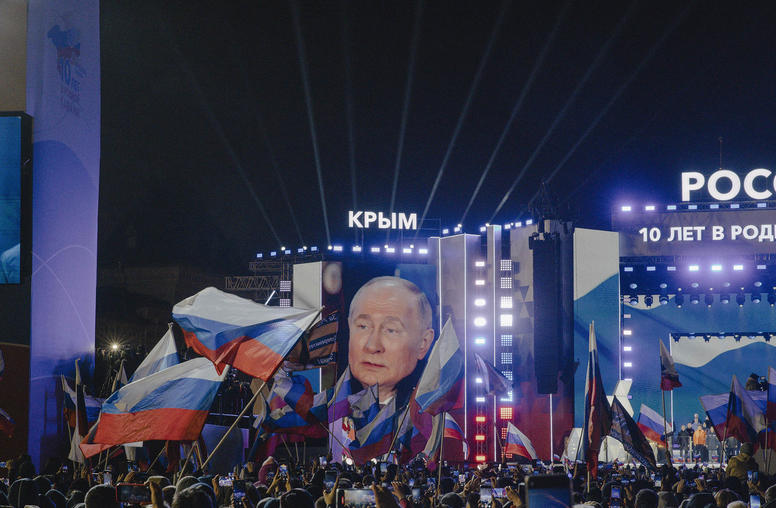Ambassador Bill Taylor on the Alleged Russian Use of Chemical Weapons
The alleged Russian use of a chemical weapon against a former Russian spy turned double agent in the United Kingdom led to scores of Russian diplomats being sent packing from the United States and Western Europe. Ambassador Taylor discusses the strong showing of unity among Western nations, and its effect on Russian intelligence gathering efforts and additional U.S. and international economic sanctions.
Complete Transcript
The transcript below has been edited slightly for content, clarity and brevity.
Scott MacFarlane (host): Let’s talk more about the expulsions: the impact they’ll have here and there. Bill Taylor joins us from the U.S. Institute of Peace. He is the former U.S. ambassador to Ukraine. Bill, good morning. Is this expulsion news playing out the way you expected it to?
Ambassador Bill Taylor: Good morning, Scott. In some ways yes, in some ways no. What’s unexpected – and welcome – is the strong show of unity by Western nations. Every now and then, we’ve seen this show of unity, but it hasn’t been consistent, and it’s been fraying recently. So, this has been a new shot that has galvanized Western nations to take unified action against Russian aggression, [which] is what’s necessary. That said, the expulsions and the threats of counter-actions are to be expected.
SM: What impact do you think those American expulsions, the ones that happened here in the continental U.S., will have here? Is anyone going to notice that?
BT: Well, sure. There are some Russian citizens who will find it more difficult to get citizen services – what consulates provide to their nationals. So Russian citizens might have some difficulties. American citizens who might be thinking about travelling to Russia on tourism or business may find it harder to get visas. Probably the number of Americans travelling to Russia is going to continue go down. It’s not particularly welcoming for Americans in Russia these days.
SM: Is it a symbolic gesture against Russia or is there a real practical impact on that country because of this?
BT: I think it’s more than symbolic. Certainly, the expulsion of spies will have an effect on the Russians’ ability to gather information, to undertake their spying activities. That will be effective, that will be deteriorated, that will be made more difficult for them. But if it’s a part of a broader strategy, if it’s not just the expulsion of spies, but if it’s continued sanctions, for example… I would imagine that we’ll see some additional U.S. sanctions, maybe some international sanctions, on the Russians. The sanctions have been mounting, and I would expect to see more economic sanctions very soon.
SM: Let’s play this out further. You heard from the Kremlin spokesman Dimitry Peskov, who says that whatever Russia’s response will be, it will be “timely and suit the interests of Russia.” What would you anticipate the long and short-term responses from Russia to be?
BT: They’ll probably send some more Americans home. The expulsion of diplomats, of spies, of going back and forth, is not the major effect. The big effect we can have on the Russians is through economic sanctions, on oligarchs, on organized crime, [those] who park their money abroad. We can crack down on those. The Russians can’t really do that. The Russians don’t have the ability to respond in that case. We – the West – have a definite advantage in that it’s united against the Russians. The Russians have isolated themselves by walking away from standards of international behavior that they had been adhering to, more or less, for some time after WWII, and certainly after the end of the Cold War. They had been abiding by international law, standards, and treaties and they’ve walked away from that. So, they’ve isolated themselves.
SM: What is the U.S. ambassador in that part of the world going through right now? What is the Russian ambassador here going through? It must be a particularly sensitive time to do that job.
BT: I’m sure it’s difficult for the Russian ambassador here, who is new. The previous ambassador, Ambassador Kislyak, was notorious for meeting with a lot of people during the election campaign, which got those campaign officials in trouble. Our ambassador there, Ambassador Huntsman, is an experienced ambassador. He was our ambassador to China. He’s now the ambassador to Moscow. And yeah, he’s got a hard job. He’s representing the United States in a country – Russia – that’s not playing by the rules and standards of international behavior that we have come to expect. And we’re now disappointed that they are not. So, I’m sure that trying to represent the United States in that country is difficult.
SM: At this time, do you think that Russia is engaging more with our diplomats, or cutting them off?
BT: I imagine that it’s difficult for Ambassador Huntsman to have senior-level discussions in Moscow. It’s probably difficult for the Russian ambassador here to get meetings, and I imagine the Russians are doing the same to Ambassador Huntsman.
SM: So, what do you do? Do you try to find an intermediary to help get a back-channel?
BT: You attempt to build and maintain discussions with Russian people. We have no complaint, no argument, with the Russian people. We respect the Russian people. Russian society is a rich one in many respects. It has made some contributions to world literature and world culture. It’s that kind of people-to-people relationships that I think Ambassador Huntsman and our embassy are pursuing there now.
SM: It’s somewhat disturbing to see this play out, but nonetheless it’s fascinating political and diplomatic theatre, for better and for worse.
On Peace is a weekly podcast sponsored by USIP and Sirius XM POTUS Ch. 124. Each week, USIP experts tackle the latest foreign policy issues from around the world.


